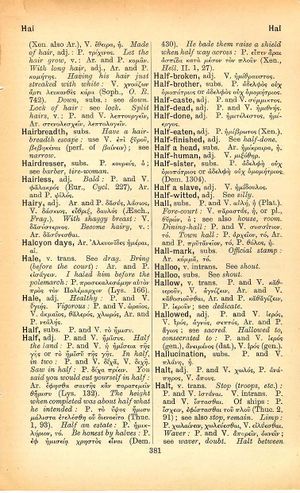halt
From LSJ
λέγεις, ἃ δὲ λέγεις ἕνεκα τοῦ λαβεῖν λέγεις → you speak, but you say what you say for the sake of gain (Menander, fr. 776)
English > Greek (Woodhouse)
adj.
P. and V. χωλός, P. ἀνάπηρος, V. ἄπους. v. trans. Stop (troops, etc.): P. and V. ἱστάναι. V. intrans. P. and V. ἵστασθαι. Of ships: P. ἴσχειν, ἐφίστασθαι τοῦ πλοῦ (Thuc. 2, 91); see also stop, remain. Limp: P. χωλαίνειν, χωλεύεσθαι, V. εἰλύεσθαι. Waver: P. and V. ἀπορεῖν, ὀκνεῖν; see waver, doubt. Halt between two opinions: P. ἐπαμφοτερίζειν. Know you what part of your tale halts the most? V. οἶσθʼ οὖν ὃ κάμνει τοῦ λόγου μάλιστά σοι; (Eur., Ion, 363). subs. P. ἐπίστασις, ἡ (Xen.), ἐπίσχεσις, ἡ; see delay.
German > Latin
halt! durch die Imperative der Verba unter »halten no. II, 2«.

